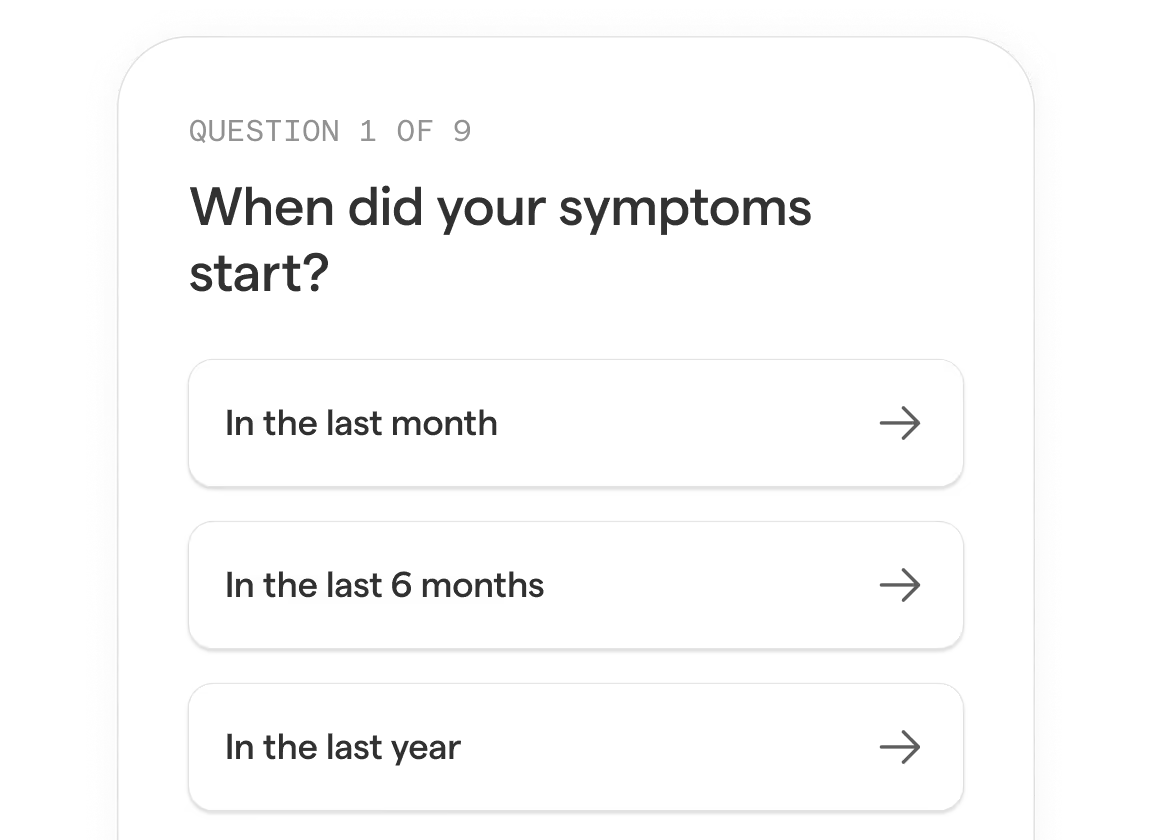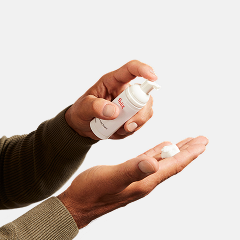Download the Felix App
Earn reward, visit our shop and get exclusive offers on the app
Download now

Through Felix, you can get Activelle® prescribed by a licensed healthcare practitioner with free delivery to your door.
Activelle is a medication that combines both estradiol (identical to the natural hormone estrogen) and progestin in a single tablet.
It’s used as a treatment for:
Activelle should only be used in women that have an intact uterus.
For more resources, including a full list of the risks and benefits of Activelle, please review the product monograph.
As the female body enters the menopausal and postmenopausal life stages, it begins producing less estrogen. This is a natural, universal transition.
However, reduced levels of estrogen can lead to unpleasant symptoms in some women (i.e., heart palpitations, mood changes, hot flashes, etc.).
Activelle works by providing estradiol to the body (virtually identical to the naturally produced hormone estrogen). This reduces the severity of certain vasomotor menopause/postmenopause symptoms (i.e., hot flashes, night sweats, excessive sweating, etc.).
The progestin hormone that is also in an Activelle dosage works in combination with the estradiol to help prevent endometrial hyperplasia (overgrowth of the lining of the uterus), as well as cancer of the lining of the uterus (endometrial carcinoma), if left untreated.
Activelle is used to treat women that have intact uteri, who are experiencing moderate to severe vasomotor symptoms associated with menopause and postmenopause, or vulvar or vaginal atrophy associated with menopause.
These symptoms relate specifically to temperature regulation within the body, leading to things like hot flashes, night sweats, feeling uncomfortably hot, or excessive sweating.
Because Activelle also contains the progestin hormone, it also helps reduce the chances of endometrial hyperplasia (overgrowth of the lining of the uterus) occurring.
Activelle tablets are to be taken orally, once a day. It can be taken with or without food.
It’s a good idea to try and take your Activelle doses around the same time each day, so that the medication maintains the highest possible level of efficacy throughout your treatment cycle.
There are 28 pills in each Activelle dial pack, and you should follow the instructions closely on the package, so that you can use the pack to help track your Activelle doses (and avoid missing any).
Some potential side effects of Activelle that could occur include:
If any of these side effects of Activelle start to become severe, be sure to talk to your healthcare practitioner. They may be able to suggest an alternative medication that will work better for you.
MHT is the most effective treatment for menopausal symptoms and has been shown to prevent bone loss.
In menopausal women who start appropriately-dosed MHT prior to age 60 OR within 10 years of their last period, the health benefits outweigh the risks.
Risks of MHT are considered very rare (~1 case per 1000 to 10,000 women on MHT per year) and may include:
These conditions are all rare, but they highlight the importance of having a full discussion with your healthcare practitioner; especially if you’re experiencing moderate to severe side effects.
Individualization is key, and your MHT treatment plan should be reassessed (at least) once a year to monitor your health, as well as ensure that you are on the correct dosage and formulation. Your practitioner can help you find balance between treating your symptoms safely, and avoiding increased risks.
There are certain people that shouldn’t use Activelle, including:
In addition to these people, there are others that should be extra cautious about taking Activelle. Be sure to talk to your healthcare practitioner before starting Activelle if you:
Drugs that may interact with Activelle include:
Grapefruit juice may increase the effect of Activelle.
If any of these conditions apply to you, your practitioner may want to suggest an alternative medication that could work better for you.
Further reading








Felix is Canada’s first truly integrated healthcare platform. We provide on-demand treatment for everyday health needs like weight loss, mental health, sexual health, and more. Founded in 2019, our digital-first approach to healthcare includes everything from diagnosis to prescription — all accessible from the comfort of home.
No. Felix provides a faster, hassle-free way for you to get a treatment plan for certain conditions, but our service does not replace your primary care provider. For matters that extend beyond obtaining a lifestyle treatment safely and easily, we encourage you to consult your primary health practitioner in person — whether for checkups, personal health concerns, or to inform them about your current treatments or treatment plans.
Absolutely. Our online assessments have been designed to ask all the necessary questions required for diagnosis. We've worked with specialists to create an assessment process that can provide sufficient information for the healthcare practitioner to determine whether or not you are eligible for a prescription and craft an appropriate treatment plan.
Call 911 or proceed to your nearest emergency room immediately. Felix is not intended for medical emergencies. Once the emergency has been addressed or resolved, contact your prescribing practitioner to inform them of your experience as this may impact your current treatment plan.
Anyone who is 18 years or older (16 or older for acne and birth control prescriptions), and is located in Alberta, British Columbia, Manitoba, Newfoundland and Labrador, Nova Scotia, Prince Edward Island, Saskatchewan or Ontario. We cannot ship treatments outside of these provinces at this time.
After creating an account, you will complete a medical assessment for evaluation by one of the Felix healthcare practitioners.
During your assessment, you will have the opportunity to send your practitioner questions via secure messaging.
In most cases, practitioners will complete your assessment with secure messaging alone but sometimes they may determine you require an audio or video visit and/or further diagnostic testing to help determine the best treatment plan for you.
If your practitioner has determined a prescription treatment is appropriate, they will approve your visit and write you a prescription. Our pharmacy will then ship your prescription to your home.
You’ll be able to message your healthcare practitioner if you have questions or want to make changes to your treatment at any time.
No. We use an asynchronous telemedicine model so you can complete your online visit in your own time and we save your progress so you can come back later to finish it.
If you are completing a visit in the mental health or weight loss categories, your healthcare practitioner may require a phone or video call to discuss your medical profile further during the assessment process.
Most assessments do not require a phone or video conversation. Once a prescriber has reviewed the info in your assessment they will respond to you via secure instant messages that you can access within your Felix account.
If you are completing a visit in the mental health or weight loss categories, your healthcare practitioner may require a phone or video call to discuss your medical profile further during the assessment process.
You can expect to receive a response from a healthcare practitioner within 24 hours of submission. If you’ve been waiting longer than this, please reach out to our Patient Support team through the chat bubble in the bottom right corner of your account or our Contact Us page.
No. A visit with a licensed healthcare practitioner is required for all treatments currently provided through Felix’s service.
Not long. After completing your assessment, a practitioner will generally respond within 24 hours, and often much sooner.
Treatment plans will be processed within 2-4 business days of your approval date if there is nothing blocking fulfillment.
All packages usually takes 2-3 business days. You will receive an email with your tracking number once your treatment has been shipped.
Absolutely. All Felix shipments arrive in a nondescript blister package so you can have your treatment shipped wherever makes sense for you as long as there is someone there to sign for it.
A signature upon delivery may be required.
There is currently no cost to have your treatment shipped to you from our Felix Pharmacy network.
Yes, your security is paramount to Felix’s mission. Personal health information provided during your medical assessment is strictly and legally confidential between you and the Felix healthcare practitioner.
Beyond that, all your account information (including the medical assessment, credit card, and shipping information, etc.) is also stored safely and securely. Felix is compliant with all federal and provincial health privacy legislation. It is our duty to protect your data with comprehensive security infrastructure and stringent data policies to ensure it stays private and secure.
Read more on our Privacy Policy.
Yes! In Canada, only a licensed healthcare practitioner can write a prescription, and only a registered pharmacist can fill that prescription. We are supported by leaders in the Canadian pharmacology and specialized medical fields. Felix adheres strictly to all the regulations set forth by all applicable Colleges of Pharmacists and Colleges of Physicians and Surgeons in which we operate.
Absolutely. All prescriptions obtained via Felix are provided by licensed Canadian healthcare practitioners—the same as you would get at a hospital, doctor’s office, or clinic. These practitioners do not provide prescriptions unless they deem it medically safe and appropriate to write them based on your medical profile and assessment answers. Our assessments have been crafted by the practitioners on our medical team. Finally, all Felix Pharmacies are provincially accredited just like any retail pharmacy.
Your privacy is our top priority. All your data is 256 bit SSL/TLS encrypted, and we take significant steps to keep your data secure. You can read our Privacy Policy for more information.
Felix charges a fee for the online visit. In most cases the fee is $40 but varies by treatment category. The visit fee includes a prescription valid for up to a year (depending on the condition) and on-going support from the healthcare practitioner or pharmacist.
It depends. Treatment costs vary but will be in line with what you would pay at a pharmacy in person. You will see the estimated cost of your treatment before insurance, during the online visit but will only be billed for medication costs for your prescription once it is approved and sent to our pharmacy. Once approved, your treatment and payment will be processed within one to two days.
Keep in mind that you won’t necessarily need to pay the full price yourself. If you have insurance, Felix’s partner pharmacies will bill your insurer directly. You may also be eligible for financial support in your province.
We accept all major credit cards for any aspect of your treatment not covered by insurance or other financial support
Treatment coverage varies greatly between different insurance plans.
The good news is that if you are covered, Felix can bill your insurer directly, and then process your treatment plan at no additional cost to you. We recommend that you upload your private and/or provincial benefit card during the online visit so that our pharmacy partner can apply any coverage you are eligible for before processing your treatment plan.
Insurance coverage for treatment plans through Felix doesn't include the cost of your visit.
A Felix online visit is considered asynchronous since it is conveniently completed through a secure chat bases system. Currently, asynchronous visits are not covered by insurance or provincial health plans so you will be charged a visit fee, depending on the category of treatment you are requesting.
Medication coverage varies greatly between different plans, provinces, and has specific criteria that determine eligibility. For private insurance, we recommend contacting your benefits administrator with your details and the Drug Identification Number (DIN) and the drug name to determine your coverage.
For more details on provincial health plan coverage see below:
Alberta: Learn more about AHCIP here. Search for covered drugs here.
British Columbia: Learn more about MSP here. Search for covered drugs here.
Manitoba: Learn more about MHSIP here. Search for covered drugs here.
Newfoundland and Labrador: Learn more about MCP here. Search for covered drugs here.
Nova Scotia: Learn more about MSI here. Search for covered drugs here.
Ontario: Learn more about OHIP+ here. Search for covered drugs here.
Prince Edward Island: Learn more about Health PEI here. Search for covered drugs here.
Saskatchewan: Learn more about Saskatchewan Health Coverage here. Search for covered drugs here.












